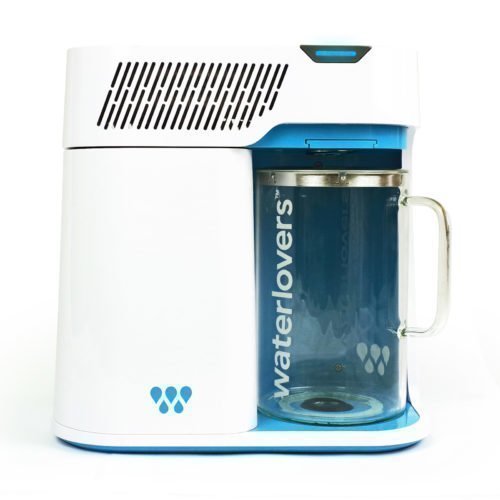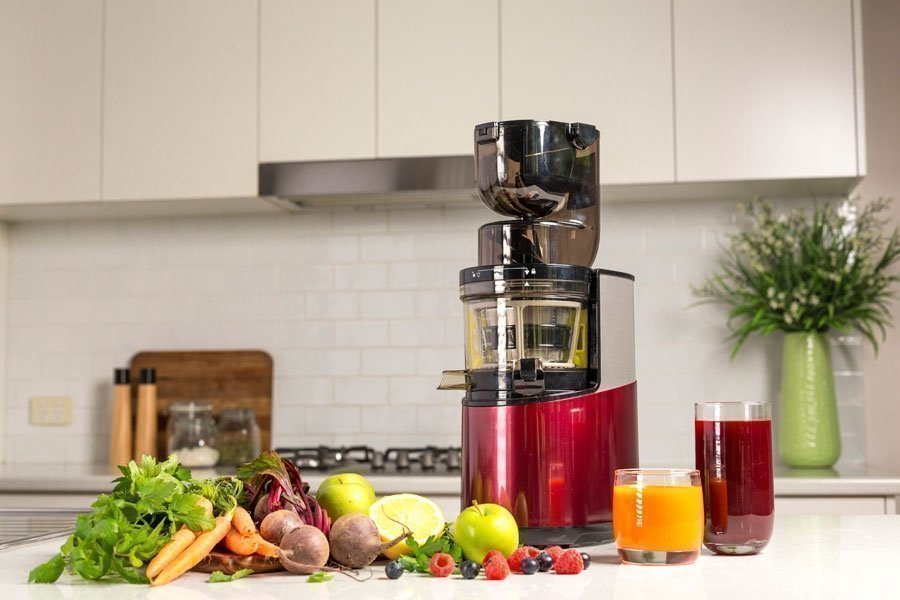Vitality 4 Life uses cookies to provide and improve our services, if you continue browsing, we consider that you accept its use. For more information, please see our privacy page.
-
Read More
How does the 2800 Waterlovers Water Distiller purify water?
The boiling reservoir is filled with contaminated water or general tap water and is then locked into place and with a touch of a button it starts. At boiling point the water evaporates into steam and travels through the stainless steel coils where the steam is cooled and converted back into liquid form. During this process harmful contaminants are left behind in the boiling reservoir, and pure water passes through the activated coconut charcoal filter as it drips into the glass collection jug. You can drink this water straight away (cooled with distilled water ice cubes) or place the jug into your fridge. Or have plenty distilled water available and have an extra glass jug.
Does the water come into contact with any plastics?
No, from the 304 Stainless Steel boiling reservoir the water travels through Stainless Steel coil piping and Activated Coconut Charcoal before collecting into the laboratory grade thermal-shock resistant glass made from Borosilicate.
Will the 2800 Waterlovers Water Distiller remove fluoride?
Yes, distilling water is one of the most effective ways if not the most in removing fluoride from tap water. Results of 99-100% removal of chemicals such as fluoride, chlorine, lead, arsenic, heavy metals and bacteria is expected and common.
How much electricity does it use?
The 2800 Waterlovers Water Distiller’s Smart technology allows the machine to save energy with its initial rapid boil to quickly bring the water temperature to a boil within a few minutes. After boiling point, the distiller operates at variable power range of 500w-750w which is determined by the current room temperate. Our Smart technology detects room temperature and will adjust its power use to conserve energy use. For warmer
-
Read More
Most of us know drinking pure water is essential to life – so what is in our water that is potentially harmful to our health?
Chlorine and lead is in everybody’s water, but there are also traces of pesticides, herbicides, industrial solvents and bacteria. Almost every chemical we use in our society works its way into our water supplies.
What people are not aware of is that municipal water treatment does not take those contaminants out. The treatment only kills certain bacteria and removes the visible particles, it does not take out synthetic organic chemicals, this needs to be done in our own homes.
What can these chemicals do to our bodies?
Synthetic organic chemicals increase the risk of degenerative disease and cancer. Almost all types of cancer are linked to increased exposure to synthetic organic chemicals such as pesticides, herbicides, chlorine and trihalomethanes, which are added when chlorine is put in to our water. Colon cancer, bladder cancer and breast cancer have all been directly linked to an increased consumption of synthetic chemicals.
What to do…
Bottled water?
Bottled water does not necessarily mean that you are getting chemical free water and the common misconception is that bottled water is purer than tap water. There are fewer regulations governing bottled water than tap water and most studies show that bottled water contains most of the chemicals that tap water does. Furthermore, any liquid that is stored in a plastic bottle is going to contain some of the chemicals from the plastic that leach into the water, which some studies have shown contain carcinogenic properties.
The environmental consequences of bottled water are tragic and statistics show that 60 million plastic bottle are thrown into landfills every day in America alone, where it takes thousands of years for
-
Read More
Healthy Water... is the #1 Ingredient For Healthful Longevity!
Reprinted with permission from Fitness Plus Magazine, December 2002The importance of “healthy water” and where to get it may very well be the most beneficial health information any of us can learn. The simple fact that our body is over 70% water, tells us how extremely important its quality is.
Without an abundant intake of healthy, chemical free water… every other wellness effort is to a large degree in vain.
While every health and wellness expert will agree on the importance of “healthy water”, most have different opinions on its definition and source. The fact is that it’s no longer a matter of opinion. There’s now enough credible scientific data on the subject for a logical and reasonable conclusion.
The healthiest water doesn’t come from your tap, doesn’t come in a bottle, it doesn’t come from distillation or reverse osmosis… it comes from “selective filtration”.
All tap water in America contains trace levels of synthetic chemicals, heavy metals, parasites and/or chlorination by-products that pose significant health risks. We can either filter out these poisons prior to consumption, or we force our body to become the filter. Many have switched to bottled water under the false assumption that its’ purity is assured to be better than tap.
The truth is that bottled water is only required to be “as good as” tap… not better.
And the Federal guidelines that govern bottled water quality only apply if it is transported across state lines. Most bottled water is bottled and sold within the same state in order to avoid regulation. It’s an industry built on deception. Bottled water is currently the fastest growing and most profitable segment of the entire beverage industry. “Companies that market
-
Read More
Adsorption: Adsorption is a chemical process in which an ionic filter media is use. The filter attracts water contaminants and encourages these contaminants to break their bond with the water molecules.
Alachlor: Alachlor is an odorless, colorless solid, used as an herbicide for grasses and other broadleaf plants. Ingestion of Alachlor in drinking water can increase risk of cancer and cause liver and/or kidney damage.
Atrizine: Atrizine is a white, solid crystalline compound. It is currently the most widely used pesticide chemical. Ingestion of Atrizine can cause cancer and damage the cardiovascular system.
Benzene: Benzene is a colorless, aromatic liquid that is widely used in producing rubber, plastics, and other synthetic materials. Ingestion of Benzene can lead to cancer and/or chromosome aberrations.
Chlorine: Chlorine is a yellowish, poisonous gas with a pungent odor, widely used as a disinfectant in drinking water. Ingestion of chlorine can lead to bladder, rectal, and/or breast cancer.
Cryptosporidium: Cryptosporidium is a protozoan microbiological contaminant that is resistant to the disinfecting capabilities of chlorine. Ingestion of cryptosporidium generally leads to gastrointestinal illness.
Cysts: Cysts are chlorine-resistant microorganisms. When ingested in drinking water, they most commonly cause gastrointestinal illness, accompanied by vomiting, diarrhea, and cramps.
Lead: Lead is a metal contaminant that occurs in drinking water as a result of the corrosion of pipes in a plumbing system. Ingestion of lead can cause severe developmental delays in children and kidney failure and/or stroke in adults.
Lindane: Lindane is a white, crystalline powder that is commonly used as a chemical in pesticides. Ingestion of Lindane can result in liver and/or kidney damage.














